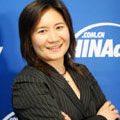Most Chinese women would like to have more than one child, says a survey by the National Family Planning Commission.
Jiang Fan, vice-minister of the commission, said: "Our research shows that 70.7 percent of women would like to have two or more babies.
"The figure rose 7.6 percentage points between 2001 and 2006, which indicates a possible baby boom," he said.
The survey was conducted in 2006 but released only yesterday.
Most women (83 percent) want a son and a daughter, the survey said.
Some mothers think only-children suffer from loneliness and can be spoiled, Jiang said.
"Only-children often grow up to be self-centered," magazine editor Lin Ying, 26, said.
She said she wants to have two children in the next five years.
Except in Henan province, which is home to about a tenth of China's population, married couples who are both only-children can have two children of their own.
Despite people's desire to have more children, the commission said China will achieve its goal to keep its population within 1.36 billion by the end of next year.
Li Bin, minister of the commission, said authorities are likely to stick to their family planning policies.
"China's family planning policy underpins the country's economy and demographics," she said.
Population researchers have said women's desire to have more babies is understandable.
"People's desire to have more babies is often influenced by economic and cultural factors," Duan Chengrong, a professor with the research center for population and development at the Renmin University of China, said yesterday.
"It is very common for families to want more than one child in an ageing society," he said without elaborating.
Although some people opt for a "dink" (double income, no kids) lifestyle, it is not very popular in China, he said.
Between the 1900s and 1950s, most families had three or four generations living under the same roof. The extended family structure became the dominant family structure from the 70s to the mid-80s.
Since the late 70s, when China introduced its family planning policy, the most common structure was transformed from extended to nuclear.
(英语点津 Helen 编辑)

About the broadcaster:
 Bernice Chan is a foreign expert at China Daily Website. Originally from Vancouver, Canada, Bernice has written for newspapers and magazines in Hong Kong and most recently worked as a broadcaster for the Canadian Broadcasting Corporation, producing current affairs shows and documentaries.
Bernice Chan is a foreign expert at China Daily Website. Originally from Vancouver, Canada, Bernice has written for newspapers and magazines in Hong Kong and most recently worked as a broadcaster for the Canadian Broadcasting Corporation, producing current affairs shows and documentaries.
